Cable rows are a staple for any back workout, but sometimes, you just hit a plateau. Enter the landmine row: add freshness and variety to your back workouts and give yourself a new challenge.
Now, I’m not exaggerating. Landmine rows have become my favorite back exercise. Why? Because they offer a unique twist (literally) on the classic barbell row.
The landmine setup forces a more natural pulling motion that feels incredible on your back muscles. Trust me, after a few sets of landmine rows, you will feel the difference: growth.
Let’s discuss this in detail.
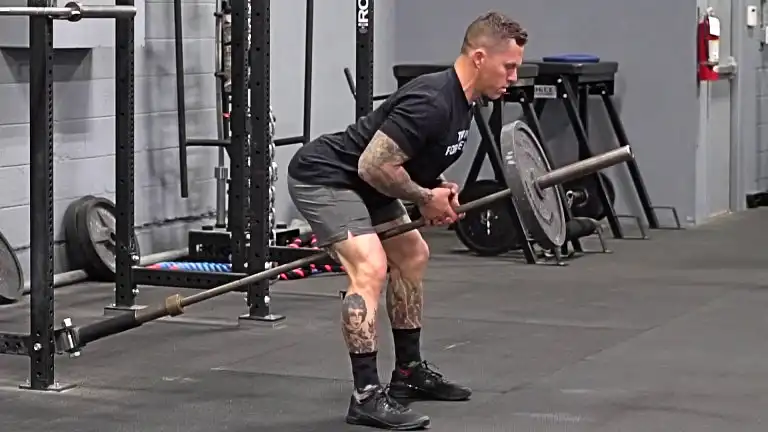
- What Is A Landmine Row Exercise?
- Landmine Row Muscles Worked
- How To Do Landmine Row
- Form and Techniques
- Best Variations of Landmine Rows
- 1. Single Arm Landmine Row
- 2. Meadows Row
- 3. Bench-Supported Landmine Meadows Row
- Landmine Row Alternatives
- Landmine T-Bar Row Benefits
- 1. It’s Gives Total Back Exercise
- 2. Strengthen the Core
- 3. Minimal Equipment Required
- 4. Reduce the Chance of Injury
- 5. Low Intimidation Factor
- 6. Strengthen the Posterior Chain
What Is A Landmine Row Exercise?
Landmine Row, also known as T-bar Row or V-bar row, is extremely versatile and effective for building functional strength through all planes of motion and packing on some serious muscle mass.
The landmine attachment is great for performing landmine rows but is not mandatory. You can rest the barbell against a secure surface like a wall, box, or other object or on a non-slip surface.
To do landmine row exercises, you need only a barbell and maybe some weight plates. You must confirm that the bar is stable and will not slip.
I will show you the best landmine variations, which give you a complete back workout and improve hypertrophy and strength.
Know More: Landmine Exercises For Building Muscle And Strength
Landmine Row Muscles Worked
The landmine row is a compound exercise that simultaneously activates and trains various muscle groups.
Landmine Row exercises are especially effective at targeting your major muscle groups of the Back: Latissimus dorsi, Rhomboids, Teres major and teres minor, Erector spinae, Posterior deltoid, Trapezius and Infraspinatus.
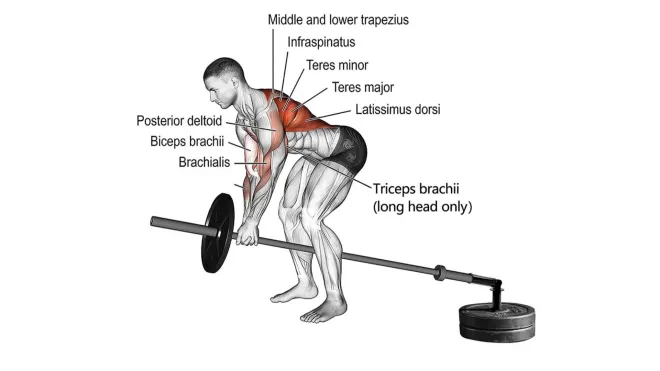
The exercise also works the arms and grip, including the Brachialis, Brachioradialis and Biceps Brachii
The body must also keep the movement stable, making the core work hard. This results in greater core strength and stronger abs.
How To Do Landmine Row
Check the correct execution technique and blast your back muscles.
- If you are using a classic bar, you must ensure that one of its ends is blocked by placing it in the corner of a wall. The best way is to use a landmine machine or attachment.
- Load the other end with the desired amount of weight. With the barbell loaded, stand over the bar with a wide stance.
- Get into a bent-over position with your spine straight and chest up.
- Bend at the hips and keep your back arched throughout the movement.
- Depending on your interest, you can tilt your torso between 15-45 degrees above parallel, but no more.
- Grab the barbell with the V-attachment or directly and lift it until it touches your chest.
- Focus on contracting your mid-back muscles by sliding your shoulder blades back until they are together at the end of the range of motion.
- Now, slowly lower the bar until it nearly touches the ground.
Form and Techniques
Although landmine T-bar row is safe, but you must take certain precautions. Follow these tips when using a landmine:
- Focus on good, proper form before using heavy loads. Once you are comfortable with the movement, add weight and since it’s plate loadable, you can do so in smaller increments!
- Do not use more weight than you can handle. This fatigues your spinal erectors and says goodbye to form.
- You should pay attention to the position of your shoulder blades. During the eccentric phase, shoulders should be actively retracted and lowered to prevent too much forward movement.
- Make sure your set-up is secure before each exercise, especially if you are using a corner wall. Sometimes, the bar can move out of position when loading it.
- Like any other exercise performed in this position, constant effort must be made to prevent the back from rounding.
- To increase range of motion, use small discs rather than Olympic discs with a large diameter.
- Warm up before doing landmine row.
- The barbell will move in an arc rather than a straight path, so get used to that feeling.
- Choose the number of reps you want to do based on your goals. For Muscle Growth, 6–12 reps per set; for Strength, 3–8 reps per set and for muscle endurance, do 15-20+ reps per set.
| Level | Sets | Reps | Frequency |
|---|---|---|---|
| Beginner | 2-3 | 8-12 | 1-2 times per week |
| Intermediate | 3-4 | 8-12 | 2-3 times per week |
| Advanced | 4-5 | 8-15 | 2-3 times per week |
Best Variations of Landmine Rows
We highly recommend trying other variations of T-bar landmine rows for an intense workout that will work your upper body harder and recruit your core and lower body muscles more.
1. Single Arm Landmine Row
The single-arm landmine row is the best upper back exercise for strengthening the upper back and adding massive muscle to the region.
The one arm bent over the T-bar row works your rear delt, rhomboids, teres major, middle traps, lats, and biceps. It’s also a great anti-rotation exercise, as you must resist rotation by keeping your torso squared toward the ground.
It should be noted that there are other ways to do a single-arm row with a landmine. This one positions the landmine to your parallel rather than side with your body.
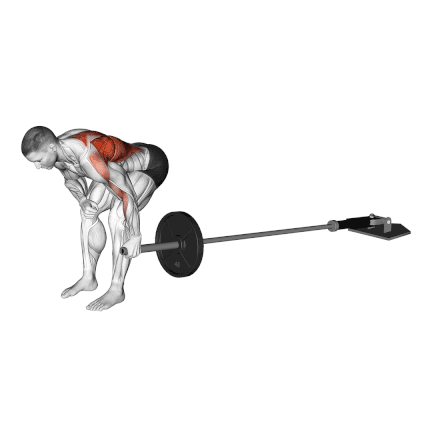
How To Do
- Stand parallel to the bar with the end of the barbell on your left side.
- Your feet should be hip-width apart. To get into a bent-over position, shoot your hip back (hinge), bend your knees slightly, and lean your torso forward. Your spine should be straight.
- Grab the collar of the barbell with an overhand grip.
- Perform a row and bring your elbow up as high as you can. Squeeze at the top.
- Slowly lower the bar back down to full elbow extension, then repeat.
2. Meadows Row
The meadow’s row is a unilateral landmine exercise used to target the muscles of the back. The landmine meadow rows also challenge one’s grip and indirectly target the muscles of the bicep.
This exercise targets your lats, traps, and rear delts. If done correctly, it will cause small tears in your muscles that will heal and make them stronger and bigger.
It is an excellent exercise for isolating each side of the back to build a balanced physique and quality strength.
This exercise is named after bodybuilder John Meadows, who popularized this movement.
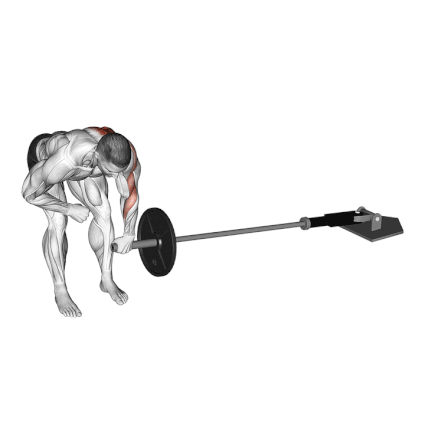
How To Do
- Position a barbell in a landmine attachment or wedged into the corner of a wall.
- Hinge forward with a staggered stance and grasp the barbell with a pronated (overhand) grip.
- Begin the movement by driving the elbow behind the body while retracting the shoulder blade.
- Pull the barbell towards your side until the elbow is at (or just past) the midline.
- Then, slowly lower the barbell back to the starting position under control.
- Repeat for the desired number of repetitions on both sides.
- Keep your core tight, and remember to exhale as you lift up and inhale as you lower back down.
3. Bench-Supported Landmine Meadows Row
The bench-supported landmine Meadows row is a variation of the landmine row performed with a bench for support.
Named after legendary bodybuilder John Meadows. The combination of the bench and landmine attachment allows for a controlled and stable range of motion, which makes it an excellent option for targeting the upper back muscles.
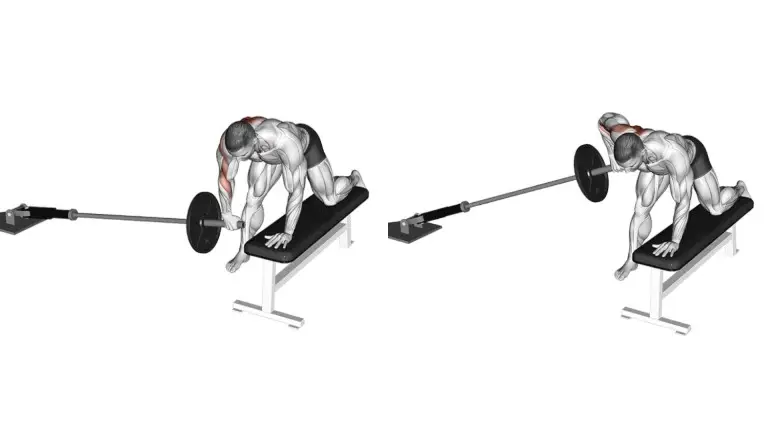
How To Do
- Set up a landmine attachment and Load the barbell with a weight.
- Place a bench in front of the landmine attachment.
- Lie on the bench with your feet flat on the ground and your knees bent.
- Grip the barbell with an overhand grip.
- Lift the barbell off the landmine attachment and hold it at your side.
- Pause at the movement’s top, then slowly lower the barbell back to the starting position.
For More Variation, Try: Chest Supported T-Bar Row
Landmine Row Alternatives
If all of these Landmine Row benefits didn’t convince you about how great this exercise is, there are some Landmine Row alternatives.
The Landmine Row Alternatives include other types of rows, such as:
- The Inverted Row,
- Dumbbell Row,
- Barbell Bent Over Row
- Cable Row
- Lats Pulldown
- Renegade Row
- Cable Face Pull
- Machine Row
- Dumbbell Pullover
- Chest-Supported T-Bar Row
- Also, other exercises, such as the Pull-up and Deadlift, are useful landmine row alternatives.
Landmine T-Bar Row Benefits
Landmine Row Benefits can be very impressive! When performed correctly and consistently over time, the T Bar row can allow you to achieve large strength gains. Some T Bar Row Benefits include:
1. It’s Gives Total Back Exercise
Landmine rows are much more than just a lats exercise. It works your entire back. This makes it a very effective exercise. If you only have time to do one back exercise, the t-bar row would be a good choice.
2. Strengthen the Core
The landmine row is executed while standing. During the movement, the core has to work hard to keep the body stable and balanced. Therefore, the T bar landmine row benefits the core, mainly the strength of the obliques.
3. Minimal Equipment Required
All you require is a barbell and possibly several weight plates. You may also use a band to provide additional resistance. While having a landmine attachment is great, but it is not mandatory.
4. Reduce the Chance of Injury
Because the end of the barbell is fixed in a landmine exercise and the bar path is more stable and predictable, T-row exercises can sometimes be a precious tool for reducing the chance of injury.
5. Low Intimidation Factor
Understandably, not everyone wants to perform barbell lifts, and nothing is wrong with this.
As I explained above, the landmine row provides similar benefits to many of the barbell rows and is much less daunting to perform. Training should be enjoyable and empowering, and should not cause unnecessary stress.
6. Strengthen the Posterior Chain
The barbell T-Row is a very effective upper posterior chain exercise, as it increases the muscular strength of all the back muscles.
References
- Encyclopedia Britannica: Back Anatomy https://www.britannica.com
- Fenwick, C. M. J., Brown, S. H. M., & McGill, S. M. (2009). Comparison of Different Rowing Exercises: Trunk Muscle Activation and Lumbar Spine Motion, Load, and Stiffness. Journal of Strength and Conditioning Research, 23(2), 350–358.
- Paulo Gentil, Saulo Soares, and Martim Bottaro Single vs. Multi-Joint Resistance Exercises: Effects on Muscle Strength and Hypertrophy. Asian J Sports Med. 2015 Jun
- J Strength Cond Res. 2020 May;34(5):1254-1263. Varying the Order of Combinations of Single- And Multi-Joint Exercises Differentially Affects Resistance Training Adaptations.
- Schoenfeld BJ. The mechanisms of muscle hypertrophy and their application to resistance training. J Strength Cond Res. 2010;24(10):2857–72. doi: 10.1519/JSC.0b013e3181e840f3.

Manish is a NASM-certified fitness and nutrition coach with over 10 years of experience in weight lifting and fat loss fitness coaching. He specializes in gym-based training and has a lot of knowledge about exercise, lifting technique, biomechanics, and more.
Through “Fit Life Regime,” he generously shares the insights he’s gained over a decade in the field. His goal is to equip others with the knowledge to start their own fitness journey.
